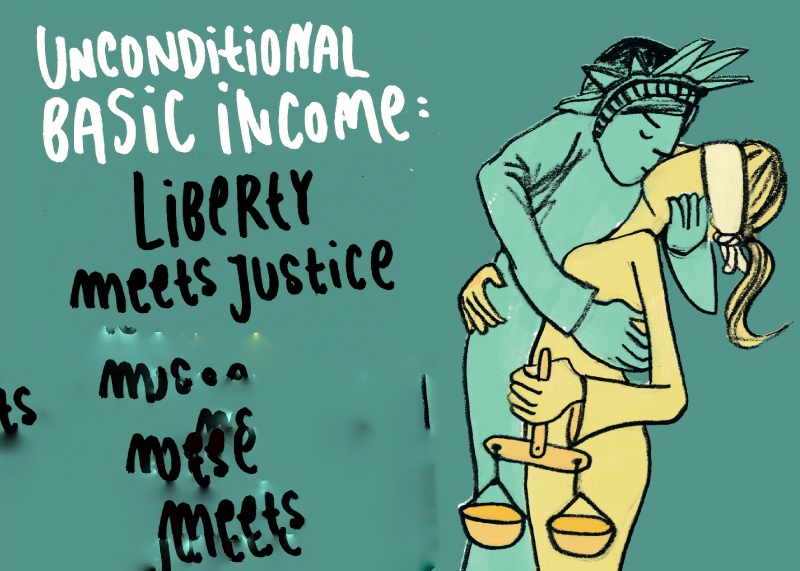What follows is the report given by me in the UBI advocates’ chat, on Tuesday the 14th of July 2020.
In the month of April this year, several English speaking newspapers[1] published some information telling the Spanish government was about to approve a UBI. No one knows where they got such a piece of news. It is true that an economist and former deputy of Ciudadanos, a center-right-wing political party in Spain, Toni Roldán, wrote an article in the well known newspaper El País, defending the necessity and possibility of giving a 1000 € emergency UBI to all Spaniards during 3 months. That article had a considerable influence on political and social circles and found and echo in the hearts of many people. The article gave rise to a lot of discussions and new articles about the urgency of an unconditional basic income. Maybe all these facts were the source of the above mentioned articles in the English-speaking newspapers, talking all of them about the imminence of a UBI in Spain.
Apart from these discussions in the media and between the politicians, the social movements were proposing the UBI too. The Spanish UBI network (Red Renta Básica) and many UBI organizations, like the Andalusian association for UBI, Humanists for UBI, Marea Básica, etc., published a manifesto asking for a 9 month’s UBI[2] (until the end of this year) and suggesting the possibility of resuming it next year, keeping in mind that the economic crisis will continue long after the pandemic finishes.
At the end of March this year, a lot of grassroot organizations launched an emergency plan[3], calling for a “quarantine UBI” during the state of alarm.
Last May, a survey into the introduction of a UBI[4] was conducted and it revealed that 56% of Spaniards were in favor of it. Moreover, between those who earned less than 1000 €, 67% were pro-UBI.
Recently, in the beginning of May, the Spanish parliament decided to put in motion the so called “Commission of Social and Economic Reconstruction”, whose aim was to study the measures to implement in order to reconstruct the economy and the society after the pandemic finishes. Several experts in different areas were called upon to give advice on how to overcome the crisis. One of them was Daniel Raventós, a Barcelona University’s economics professor considered the person who knows the most about UBI in Spain. He spoke about the necessity of a UBI as a means to attain decent living conditions, which are the prerequisite for human freedom, he confirmed the affordability of it and warned against the threat to liberty posed by the influence of big capitals on the country’s economic policies.[5] He also mentioned the pressing need for governments to establish a maximum income, at nearly 100% taxation, in order to avoid growing inequality.
It is clear that the Spanish politicians didn’t pay any attention to what Raventós said, because their plans to revitalize the economy only consider the possibility of minimum and means-tested subsidies. Thus, the Spanish government approved, at the end of May, a guaranteed minimum income scheme for vulnerable families[6], which is absolutely insufficient not only in amount but in people covered by it too. Because of its difficulty to fulfill requisites, 80% of the population who needs this guaranteed minimum income will not receive it, particularly the young people, who cannot make plans for their future due to the instability of labor market and the life’s uncertainty they have to face.
And finally, a question: this guaranteed minimum income can be a step towards UBI in Spain? Although this subsidy will not be removed when its beneficiaries find a job, and even if it is permanent, for the whole life while existing the same economic conditions, the Spanish government and most politicians clearly don’t intend to establish an unconditional basic income for the moment. The party Podemos, which included UBI in its 2014 European electoral program, removed it after the elections, arguing that the Spanish society “was not prepared” to accept the UBI. At present, only 2 small political parties propose the UBI in their political manifestos: the Humanist Party and the ecological party Equo.
Therefore, my conclusion is that there is still a long way to UBI in Spain, unless civil society strongly demand for it. And this is just the goal of most grassroot organizations, like mine.
[1] – https://www.independent.co.uk/news/world/europe/coronavirus-spain-universal-basic-income-europe-a9449336.html
[2]https://docs.google.com/forms/d/e/1FAIpQLSetinM4rVnHT_qtwiIePDUGXzx0CBHI1TS9DQAEyyDOWJxYYg/viewform
[3] http://www.plandechoquesocial.org/nuestro-plan/
[4] https://www.tercerainformacion.es/articulo/actualidad/2020/05/21/nueva-encuesta-sobre-la-renta-basica-en-el-reino-de-espana-un-56-se-muestra-de-acuerdo-con-su-implantacion
[5] https://www.sinpermiso.info/textos/intervencion-de-daniel-raventos-en-la-comision-de-reconstruccion-economica-y-social
[6] https://english.elpais.com/spanish_news/2020-05-29/spain-to-approve-guaranteed-minimum-income-scheme-for-vulnerable-families.html

